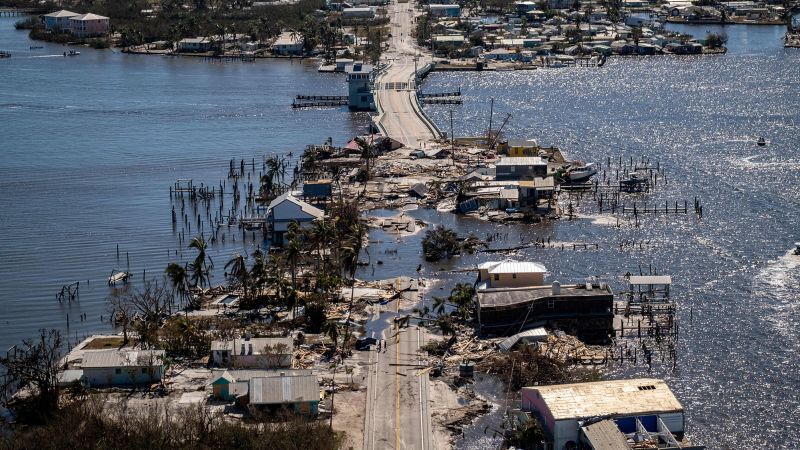The US Senate Budget Committee is launching an investigation into whether Florida’s state-backed home and property insurance company has enough money in the bank to withstand future disasters, as scientists warn warming oceans and sea level rise are making storms more destructive.
Citizens Property Insurance Corporation exists as a so-called insurer of last resort – if owners cannot convince a private insurance company to cover their property, Citizens will step in. It insures about 1.3 million policyholders in the state, who typically pay more money for a policy that covers less.
But as coastlines disappear and storms get wetter and more dangerous, risk is through the roof for many of the properties Citizens insures, putting intense financial pressure on the state-backed company. During a March press conference, Florida’s Republican Gov. Ron DeSantis said, “I think most people know Citizens has not been solvent.”
After Florida was walloped in 2022 and 2023 by major hurricanes that together cost more than $100 billion in damages, Committee Chair Sen. Sheldon Whitehouse, a Democrat from Rhode Island, is writing to top Florida officials asking for documents that show how Citizens is planning to tackle mounting costs and exposure if a massive storm were to hit a major metropolitan area, like Miami or Tampa. The letter was shared first with CNN.
“Florida is on the front line of the climate crisis, and it could take just one major hurricane to render Citizens insolvent – a fact the current governor has, himself, admitted,” Whitehouse said in a statement.
Citizens spokesperson Michael Peltier told CNN the insurer will “certainly cooperate” with the committee’s investigation.
Of major concern to the committee is that if a major city gets hit, millions of Florida policyholders who aren’t on Citizens could see massive spikes in their insurance costs. That’s because state law says Citizens can tack special assessments onto millions of Floridians with car and home insurance, even if they are insured through private companies, not Citizens.
In its letter to Florida officials, the Budget Committee expressed concern about “potential economic consequences of an eventual wide-scale decline in property values.”
Two years ago, Citizens wrote that if the state was hit by a 1-in-100-year storm, Florida insurance holders “would have been on the hook for $24 billion in assessments tacked onto monthly premiums for years.” As the number of Citizens policies have grown, reports from reinsurance companies Munich Re and Swiss Re have found that number could be much higher, anywhere from $36-$162 billion dollars, depending on how severe a future hurricane could be.
If that were to happen, the Senate Budget Committee is worried Florida might turn to the federal government looking for a bailout, Whitehouse said.
“The Committee has significant concerns about how such an insolvency would affect not only the Florida real estate market, but also the broader economy and the federal budget,” he said. “Should Florida look to the federal government for emergency relief, all American taxpayers could be on the hook.”
Fears about a possible federal bailout are not unfounded, Benjamin Keys, a real estate professor at the Wharton School of the University of Pennsylvania, told CNN.
“They absolutely have a reason to be concerned; the exposure is enormous,” Keys said. “1.3 million of the riskiest policies in the riskiest state, full stop. It’s correlated exposure – if a hurricane hits your house, it hits my house.”
Of the states that have state-backed insurers of last resort, Florida’s is by far the largest. It has steadily increased the number of consumers who can’t get insurance anywhere else, as private insurers have pulled out of the state and smaller insurers have gone bankrupt after back-to-back major hurricanes.
State insurers of last resort were originally intended as a stopgap for consumers, ensuring their coverage wouldn’t be interrupted. But in Florida in particular, many more people have been forced onto Citizens as other insurers flee the state or go bankrupt, in part because the state is particularly vulnerable to climate change-fueled losses like hurricanes and rising sea levels, according to the Senate Budget Committee letter.
That is amplified by the fact that Citizens’ policyholders have some of the riskiest properties in the state, Keys added, such as properties on the coast or ones that have flooded multiple times.
Florida isn’t alone; some major private insurers have either pulled out or stopped writing new policies in wildfire-prone California. And premiums have also spiked for consumers on California’s insurer of last resort – known as the FAIR Plan.
But Keys said there are two important things differentiating California’s FAIR plan with Florida’s Citizens. For one thing, California has far fewer consumers on its state-backed insurance – a little more than 268,000 compared to Florida’s 1.3 million. And second, if a major wildfire or storm were to hit California, state law there puts insurance companies on the hook for the high cost of special assessments, rather than individual policyholders.
“The scale is just enormous,” Keys said. “At that scale, that means there’s an extreme amount of risk.”
Keys said the Senate Budget Committee’s investigation signals the federal government is trying to get in front of a future potential disaster – and the billions of damages it could bring.
“We know that in the event of a crisis, it’s very hard for the federal government to withhold aid and support,” Keys said. “It’s not a good look.”
Read the full article here




